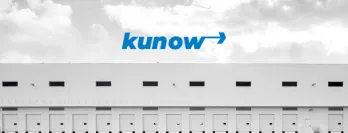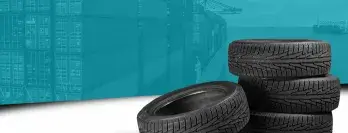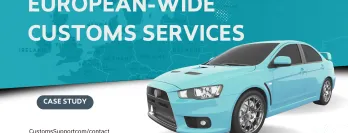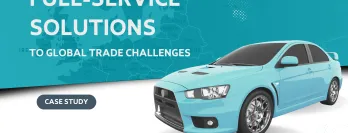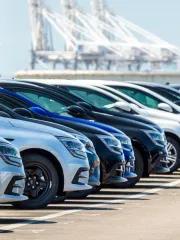
Automotive
As the leading customs expert in Europe, we can offer you individual customs solutions tailored to the specific demands of manufacturing companies. Our customs specialists can advise you on the following topics:
- Preparation of customs documentation, permits and certificates
- Support in complying with regulations and requirements within the automotive industry
- Monitoring and control of customs formalities during the transportation process

Customs Challenges | Automotive
The automotive sector represents a major industry in Europe that is continuously evolving and facing a variety of customs challenges. Automotive manufacturers source many of their raw materials and components from abroad. However, the import of these materials is subject to customs and trade restrictions, which can vary greatly.
For example, the U.S. has imposed additional tariffs on imports of raw materials such as steel and aluminum, certain automotive parts and products from China, Japan and the EU. This impacts the entire automotive supply chain and results in higher costs for carmakers and suppliers who are reliant on these raw materials and parts.
In order to encourage the electrification of the automotive industry, some countries grant tax concessions and breaks for the transport of electric vehicles and their components.
Since Brexit, customs regulations on trade between the UK and EU have also been significantly tightened. Automotive manufacturers and suppliers are now required to use customs declarations and provide additional documents in order to export or import their goods.
Customs Solutions | Automotive
Customs Support offers expert customs advice and services to improve customs processes in the automotive industry by making your customs handling efficient and cost effective.
Our customs experts can advise you on the following customs matters:
- Customs regulations and trade restrictions in Europe
- Supply chain optimisations to facilitate efficient and reliable supply chain processes
- Digitalisation and the latest customs software developments
- Customs training and workshops
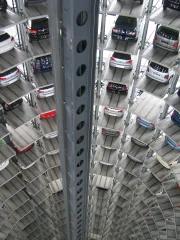
Frequently Asked Questions | Automotive
What exactly is included in customs consulting for the automotive industry?
A customs consultation for the automotive industry includes a comprehensive analysis of your customs handling, including an assessment of the regulations and requirements of the countries you are dealing with. In addition, we are able to identify potential risks and problems and develop solutions for a more efficient and cost-effective customs clearance.
How can digital technologies improve customs clearance in the automotive industry?
The use of modern technologies, such as automated customs processes and real-time monitoring of customs matters can significantly improve customs processing in the automotive industry. This helps us handle your customs matters faster and more efficiently, and reduce costs and risks.
What are the advantages of using an international customs service with offices across the EU?
Using a customs service with offices across the EU means that automotive clients can benefit from the expertise and experience of customs experts in different countries, allowing them to understand the requirements and regulations of each country, and helping them to optimise their customs operations
How important is expert knowledge of the automotive industry for customs consulting services?
Expertise in the automotive industry is critical when it comes to customs consulting services, as only a customs expert with tailored industry knowledge can understand the requirements and challenges faced by automotive companies and provide customised advise and support to meet your businesses unique requirements.
How can you benefit from an automotive customs consulting service?
A customs consulting service tailored to the automotive industry can help you streamline your customs processes, minimise risks, and increase your competitiveness. By analysing and optimising customs processes, we can help you save time and money.
Hello. Can we help you?
Customs Support Offers End-to-End Customs Services

Full-Service Customs Expertise
We have it covered end-to-end: everything from processing declarations, consultancy, to supply chain optimisation.

Experienced Specialists
Our 1900+ experts with over 20+ years of industry experience ensure the highest compliance standards.

Digital Customs Solutions
Our cutting-edge IT solutions enable you to monitor all processes 24/7, while we adapt to digital trends to ensure your security standards.

Global Knowledge, Local Presence
We link your local customs needs to our global network of professionals across 100+ strategic locations in Europe.
Automotive
Speeding Through Customs: Crossing European borders with F1
As another Formula 1 season ends, teams move their cars, parts, and equipment back to base before they are worked on for the 2023 season. This also signifies the end of another busy operation for transport companies all over the world.
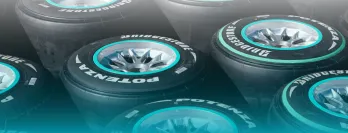
The Benefits of a Customs Project Manager
When you operate internationally and ship goods from or to the European Union, you face customs rules, regulations and procedures. Whether you are an importer or an exporter, you need to be compliant. But what happens when there is a change in procedures or regulations, and this change impacts your business?

Incoterms Explained: Free on Board (FOB)
When goods are bought or sold “Free on Board” (FOB) it means that the seller delivers the goods to a ship at a port previously agreed to by the seller and the buyer. The seller loads the goods onto the ship. The buyer then takes care of the import formalities and transportation to the final destination. Free on Board is one of the oldest Incoterms. It dates back to when goods were carried by sailing ships and it was one of the terms when the Incoterms were first released in 1936. It is also one of the most used commercial terms.
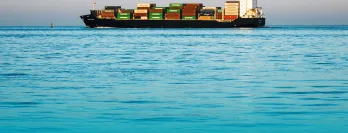
Acquisition of Kunow Group Strengthens Presence in Europe
With our focus on the growth objectives of Customs Support Group in Europe, we have acquired Kunow Group in January 2020. This acquisition greatly strengthens the position of our dynamic and innovative group. With this acquisition, we are doubling the presence in Germany and expanding to Poland. We are extremely proud of this milestone as we have the ability to serve our customers even better with our knowledge, service and services in Europe.
